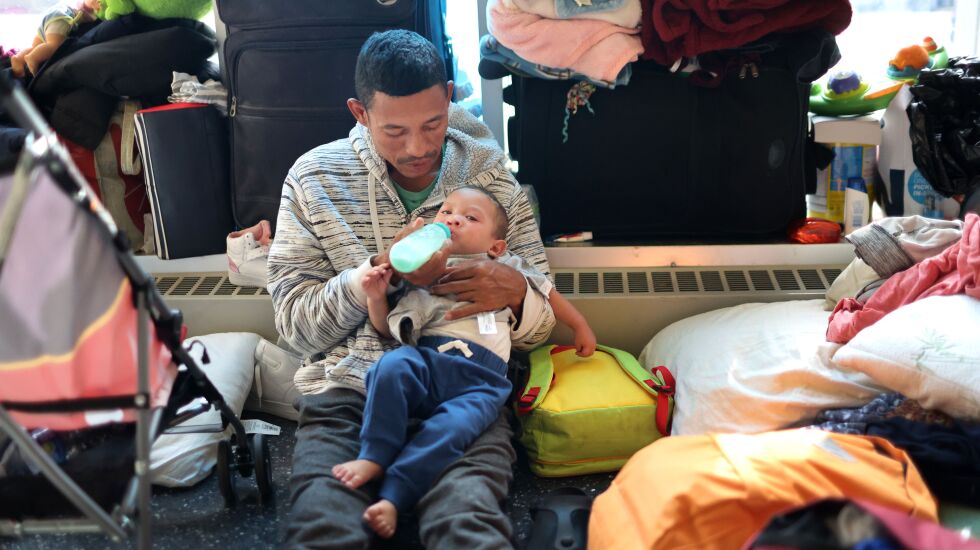
The $150 million Mayor Brandon Johnson’s 2024 budget earmarks for Chicago’s ongoing migrant crisis will only cover six months, possibly requiring a mid-year appropriation, his City Council floor leader said Friday.
“We are well aware that $150 million will not cover the expenses for the entire year…We’re going to ask the state of Illinois to step up in the same way that New York state has, and help reimburse about half of the costs the city incurs, as well as operate its own shelters,” Ald. Carlos Ramirez-Rosa (35th) told the Chicago Sun-Times.
“There’s only one entity in the state of Illinois that has stood up and said, `We are going to put our pants on and we’re going to find a way to provide shelter to the people being brought here, many times, not at their own will,” Ramirez-Rosa continued. “It is not right that the state of Illinois has not done the same…Under this mayor, the state has said, `You’re kind of on your own.’”
Gov. J.B. Pritzker and Illinois House Speaker Emanuel “Chris” Welch have essentially slammed the door on additional migrant funding during the upcoming veto session. That means Chicago will have to wait until the spring session and get in line with other entities seeking a share of the new state budget.
Ramirez-Rosa was blunt when asked what would happen if Chicago comes up empty.
“Then halfway next year, we’re going to have to have that difficult conversation,” he said.
Asked whether that means seeking City Council approval for a supplemental appropriation, Ramirez-Rosa said, “That’s possible...There are reserve funds. There are other potential sources of funding. We will have to cross that bridge when we get there.”
Ramirez-Rosa also refusedto rule out a property tax increase as a potential source of emergency funding.
During a virtual budget briefing Friday, Johnson was asked how he can realistically budget $150 million for a whole year, when the city is already spending upwards of $30 million each month on a crisis that has seen 18,000 asylum seekers descend on Chicago.
“The General Assembly — their budget process will begin in January….When they pass their budget in May, we’ll have some very intentional asks about how we can align our levels of government to meet this demand,” Johnson said.
“Mayors…will lean on the state of Illinois and the federal government as they go into their cycle this spring to do right by the city of Chicago...We are a sanctuary state,” Johnson continued. “There are people that have expressed that they’re willing to step up. But they’re gonna need the state of Illinois to do more….It’s a shared responsibility as a sanctuary state.”
A supplemental appropriation, if there is one, will not be easy to get through the City Council.
Shortly after Johnson took office, a divided Council agreed to slap a $51 million Band-Aid on the crisis after a cathartic and racially charged debate that reduced Ald. Jeanette Taylor, 20th, to tears.
Historic political tensions between Black and Hispanics have only intensified since then, with resistance growing to every new migrant shelter.
Johnson’s controversial plan to open giant tent cities he prefers to call “winterized base camps” to get 4,000 migrants off police station and airport floors before temperatures plummet has also encountered resistance. His selection of GardaWorld, the contractor he chose to build those pre-fabricated camps, has also been criticized.
No specific sites have been announced, but Ramirez-Rosa said, “We will know sooner rather than later where this first pre-fabricated shelter will be set up.
“My understanding is that the company that was chosen to erect this can do it within 72 hours once a location is identified,” he added.
Ramirez-Rosa acknowledged the controversy surrounding the city’s decision to piggyback onto an existing state contract with GardaWorld, a security company accused of mistreating migrant children at the border and labor trafficking.
“We’re gonna work to make sure that no one in any shelter operated by the city of Chicago is subjected to harm,” Ramirez-Rosa said, “and that we are doing everything possible to protect peoples’ basic human rights and human dignity.”
Ramirez-Rosa has served as Johnson’s attack dog during the migrant crisis. He has been far more pointed in his criticism of Pritzker than the mayor he serves.
The good-cop, bad-cop routine has a lot to do with lessons learned from the tensions between Pritzker and former Mayor Lori Lightfoot, Ramirez-Rosa said.
“Our prior mayor sometimes would be very combative. It wasn’t necessarily to her benefit and, more importantly, to the benefit of the city,” he said.







